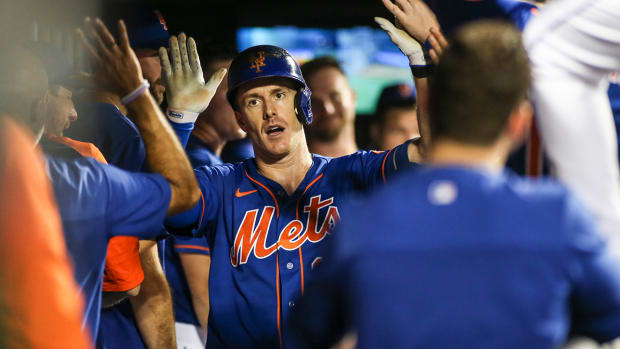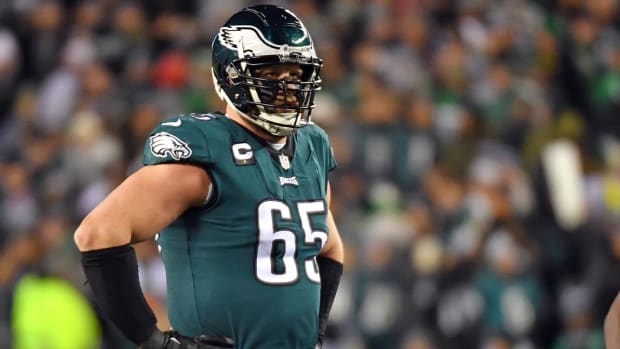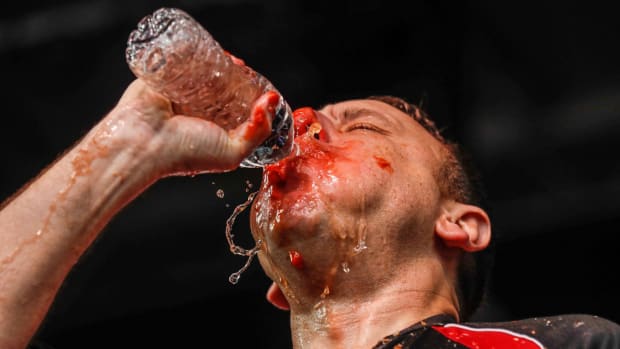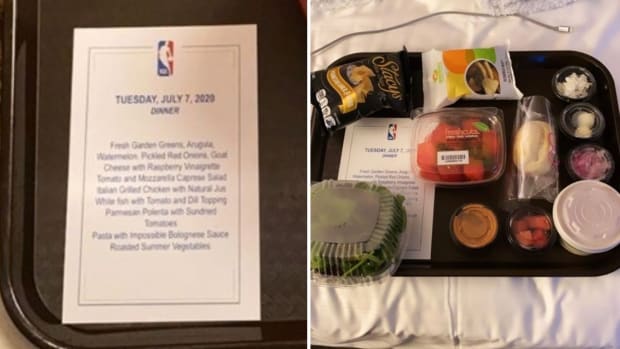What Can Be Done To Improve Food Safety at MLB Ballparks?
There’s a whole world of food safety violations at Major League stadiums that most fans would prefer not to think about. From poor employee hygiene practices to food held at dangerous temperatures, health inspectors consistently find—and correct—a myriad of issues when they enter venues year after year.
That remains the reality in 2017. Sports Illustrated analyzed thousands of public inspection records gathered from local health departments in the United States and Canada, finding that all but four ballparks reached double-digit critical violations in their most recent inspections, and one managed to break triple digits.
As a refresher, violations are observed practices that break a municipality's food code (for example, broken equipment or evidence of rodents), and critical violations are citations linked to the spread of foodborne illnesses. To see how your stadium fared in its latest inspection, view our full rankings here.
2017 MLB Ballpark Food Safety Rankings
But what does all of this actually mean? Food safety experts, while recognizing that the chances of getting sick at the ballpark are low, say that more must be done to protect fans. The abundance of critical violations, they argue, does make some fans ill and opens the door to potential health hazards.
"I would hope that we're aspiring to have a violation-free environment,” said Francisco Diez-Gonzalez, director of the Center for Food Safety at the University of Georgia. “I don't think the consumer should settle for anything less. It's just not acceptable.”
Diez-Gonzalez, a food safety microbiologist and professor, has conducted research within the field for over three decades. SI sent him copies of the compiled data for review.
The latest inspection reports from across the league revealed that almost a third of the league’s stadiums had over 100 total violations, including both Los Angeles clubs. One Chicago stadium failed its routine inspection for the second summer in a row. Eighteen ballparks had critical violations in at least a quarter of their concession stands.
These are numbers, Diez-Gonzalez said, that should make most regular stadium-goers at least slightly uncomfortable.
What Broadcasters Eat to Stay Fueled for OT
"If you're bringing people to support the team—and there are some fans that are going to be coming year after year—I think you owe it to them to make sure that the practices [being used] to prepare their food at least comply with the food code,” he said.
A violation alone is not reason for alarm, something most health departments make sure to qualify on their inspection reports. However, violations repeated over time or at multiple concession stands in a stadium can be indicative of problems at the management level, say representatives from various U.S. health departments.
Fans put their trust in the team and its vendor to make the ballpark experience safe. Track records show that these organizations are able to successfully prevent major outbreaks, but inspection records reveal practices that certainly leave room for more attention to detail.
“Not an issue that is going away”
This is not the first look at stadium food safety, and it certainly won’t be the last.
Seven years ago, ESPN’s “Outside the Lines” reviewed inspection records from 2009 in a comprehensive story that analyzed stadiums across each major North American sport. Business Insider followed up a year later. Our report uses data from '16 and '17.
Thomas Gremillion, the director of Food Policy at the Consumer Federation of America, also looked at SI’s findings. Gremillion has led the Food Policy Institute since 2015, overseeing the group’s research and advocacy.
"Food safety is not sexy stuff,” he said. “Most people don't get sick (at ballparks), but some do get sick, and for those people it makes a huge difference. It's certainly not an issue that is going away or is going to go away.”
Becky Elias, a food program manager in the Public Health Department of Seattle & King County, added that “most all of the violations are things the business can correct on-site, and a violation is essentially a feedback tool for the business. But it's when we see a pattern inspection after inspection, that's when that would be indicative of a problem."
Hornets GM Rich Cho's Next Scouting Mission: Big Time Bites
Christopher Sparks, the City of Houston’s Chief Sanitarian for Retail Food Inspections, emphasized that consumers should look at a handful of reports if they are worried about a location’s food safety.
“If you’re seeing the same violation in multiple reports, even though we’re correcting on-site, I’d be concerned,” he said. “If you’re seeing the same violation across concession stands, it’s a problem with the management company. The company isn’t doing what they need to do to ensure their employees are properly trained and following the policies and procedures the company set forth.”
SI reached out to four of the hospitality companies that run food and beverage operations at MLB stadiums. In statements, each reiterated that food safety is a top priority.
"Trapped" consumers
Almost every stadium had some sort of recurring problem in its most recent inspection. Most weren’t as unseemly sounding as animal infestation—although Camden Yards had evidence of rodent infestation at eight different food entities and Yankee Stadium had 14 stands overrun with filth flies—but food safety experts caution that any repeated violation should be taken seriously.
Food regulation involves a broad and complex range of entities, said Michael T. Roberts, the executive director of the Resnick Program for Food Law and Policy at UCLA.
Roberts, a food law scholar, published the first major treatise on the field in the United States this year. In addition to academia, he also works with various governments—from local municipalities to China—on safety and health issues.
"The real risk, it seems to me at the ballpark, is the handling of food,” Roberts said. “That's where you've got handlers cooking the food, handing it out, managing refrigeration and heating. … So it seems that the most important players in this would be local level, the county inspectors, the folks that are there to ensure quality and safety measures are being followed."
Sparks, who has overseen food safety programs in Texas for four years, is one of the many people we talked to who said he’d consider personal hygiene violations the most serious grievances in ballparks. Proper cooking temperatures are important in food service settings, but stadium food is often cooked immediately and served immediately, which puts more pressure on handling practices.
He noted that there are small things people do out of habit—touching a hat, pushing your hair behind your ear—that inexperienced handlers might forget require hand washing afterward.
Critical citations are—across the board—given for violations that directly relate to the potential spread of foodborne illnesses. Nearly every stadium in 2017 inspections was cited for inaccessible hand sinks or hand sinks that were missing soap or paper towels, and one common violation was the lack of gloves.
Your guide to the best—and weirdest—ballpark food from all 30 MLB stadiums
Nobody denies the difficulties of the task at hand. Food management companies contracted by MLB teams serve thousands of fans in rapid succession every game, and now they must deal with a new challenge: the increasing culinary demands of baseball fans.
"It's not just hot dogs and peanuts, anymore,” said Bill Marler, an attorney and managing partner of Marler Clark, a law firm that specializes in food safety cases. “There's a lot of fancy food. And fancy food can have a higher risk profile.”
The lawyer said he is not aware of any foodborne illness outbreaks at ballparks or stadiums in his 25 years in the field. He quickly added a qualifier.
“That doesn't necessarily mean much,” Marler said, “primarily because (with) most foodborne illnesses nobody ever knows what made them sick. … Just because there haven't been reported illnesses that have made it to my radar doesn't mean there hasn't been any outbreaks. But it does indicate that there haven't been any severe, bad ones that have been too big to miss.”
Diez-Gonzalez argues heightened scrutiny is warranted because of the circumstances.
"You're at a game and you don't have a lot of options to go to,” he said. “In some ways you're a trapped consumer. If you're a regular stadium-goer for a season or several years, it would be really good to be informed about what you're eating regularly.”
“That’s just smart management”
There are six food management companies that run food and beverage operations at MLB ballparks. Delaware North, Aramark and Levy Restaurants are the primary three, operating in 11, eight and five stadiums, respectively. Centerplate is the vendor in three venues, Legends Hospitality in two and Comcast Spectra Food Services solely in Oakland.
An Aramark spokesperson offered some specifics for how the company approaches food safety, including briefing staff before every event, having certified food safety coordinators on-site, conducting regular quality assurance assessments and working with independent auditors to evaluate practices.
A spokesperson for Delaware North, which operates in the most stadiums in the league, said its management team is ServSafe certified and supervisors are ServSafe trained. All associates complete a Delaware North food handling program.
While it’s ultimately up to the management company, Diez-Gonzalez said it’s important for the team to get involved, too.
"Food safety is everyone's responsibility,” he said. “The team, I think, owes it to the fans to provide the safest food supply on their menu. This starts on the server right there on the spot, and goes to the team owner."
Ten Years After 756, A Reminder of What Barry Bonds' Record Really Means
Contracts between ball clubs and hospitality companies shift liabilities and responsibilities away from the team and it is unclear whether the league gives any guidance to teams on how to best work with food management companies. Major League Baseball declined to comment on this story.
We reached out to a handful of teams to gauge their involvement in food safety measures. Spokespeople from multiple organizations directed questions to their management partner or said the team works with its partner, without offering specifics.
Marler’s advice, from personal experience, is for teams to get engaged in the process, to work collaboratively with local and state health departments.
"Having their own person oversee the venues that are run by a third-party, that's just smart management,” he said. “There's no reason not to have that level of oversight, it's not that expensive.”
Preventive steps
Health department officials and experts emphasized the importance of training food service workers in an effort to avoid being reactive, and Sparks cited proper training as a concern of his as well.
The FDA Food Safety Modernization Act, which was signed into law by Barack Obama in 2011, requires companies to develop food safety plans and implement preventive controls. Those measures would include employee hygiene training.
“The government typically does not get involved until there is a problem,” Roberts said, “but the whole Food Safety Modernization Act is built around the notion that facilities like stadiums will take preventive care and exercise caution. That's the way it's set up, for better or for worse.”
This system puts the onus on local officials and food companies to develop stronger safety procedures and oversight. Many states recommend food handler training courses, but most don’t require it. If it’s not required statewide, it’s up to a local municipality or company. According to Sparks, one thing that Houston does to mitigate potential inexperience is require a two-hour food safety course for all handlers.
Dodgers Continue to Rack Up Accomplishments, Including Owning the Best 50-Game Stretch in 100 Years
A statement from Levy said the company requires “rigorous food safety and sanitation training.” The company also said it employs third-party sanitation experts to monitor the training and practices of our team members. Delaware North said it partners with Ecosure, a third-party food safety company, to conduct evaluations, and that general managers are required to submit remediation plans for critical violations.
A spokesperson at Centerplate said in a statement that the company partners with independent food safety experts and local health departments. The company also noted that in each of the incidents cited in recent health inspections, the violations were corrected immediately.
Sparks said that, in his experience, hospitality companies do well, but that additional safety measures can only help everybody involved.
“Houston just recently had the Super Bowl,” he said. “Looking at it from that perspective, I think they did an excellent job. I think they do a great job on focusing in on the things that are most important. Us requiring the basic training helps them.”
Transparency and engagement
In the end, experts say that additional attention to ballpark food safety should be about empowering customers with information, not scaring them. Gremillion, in his work leading the Food Policy Institute, said a good motto is that a more transparent food system is a safer food system.
Any steps toward that are improvement, he said. Those measures could be posting letter grades at concession stands, offering fans a contextualized version of the most recent health inspections or publicizing trends of health inspections over time.
"I think the norm is that inspections are public record so you can find them,” he said, “but it's not necessarily easy to find."
Fans don’t need to stress, health officials say, but should pay attention. Baseball stadiums—and sporting venues as a whole—haven’t been the source of outbreaks, and Major League organizations and food management companies alike, were clear that they’re always committed to safety and improvement. Food safety experts encouraged fans to engage with their teams throughout that process.
“I hope that those very loyal fans who have been going to the same place for many years, that they would take some action,” Diez-Gonzalez said. “Contact the team. Put some pressure on always improving their practices."









